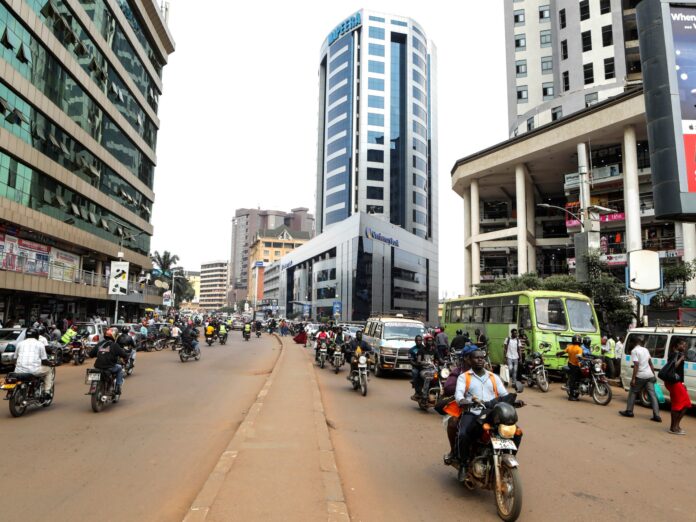Ugandans have criticised an agreement with United States President Donald Trump’s administration to receive deportees from the US, questioning the lack of approval from the East African country’s parliament and suggesting the deal is a means to ease political pressure on President Yoweri Museveni.
After facing sanctions from Washington that have targeted many government officials, including the parliamentary speaker, “Museveni will be happy” to transact with the US, said Ibrahim Ssemujju, a lawmaker who is a prominent opposition figure. “He will be asking, ‘When are you bringing them?’”
Ugandan officials have released few details about the agreement although they have stated that they prefer to take deportees of African origin and do not want people with criminal records.
However, the country is being pushed as a deportation location for high-profile detainee Kilmar Abrego Garcia, a Maryland man and an El Salvador native charged with human smuggling.
Abrego Garcia has become the face of Trump’s hardline anti-immigration policies. He has an American wife and children, has lived in the US state of Maryland for years and has been under protected legal status since 2019 when a judge ruled he could not be deported to El Salvador because he could be harmed in his home country.
He was detained on Monday by immigration officials in Baltimore. The US Department of Homeland Security said in a statement that Abrego Garcia “is being processed for removal to Uganda”.
He already has been deported as one of more than 200 people the Trump administration sent this year to El Salvador’s CECOT mega-prison as part of Trump’s crackdown on refugees, immigrants and asylum seekers in the US. His case remains a major flashpoint for the Trump administration in its anti-immigration crackdown. Department of Justice lawyers admitted that the Salvadoran citizen had been wrongly deported due to an “administrative error”.
Abrego Garcia was severely beaten and subjected to psychological torture in the El Salvador prison, his lawyers say.
‘The whole scheme stinks’
Without parliamentary oversight, “the whole scheme stinks,” said Mathias Mpuuga, until recently the leader of the opposition in Uganda’s Parliament.
He said the agreement with the US left him “a little perplexed” because Uganda is struggling to look after refugees fleeing conflicts in neighbouring countries, such as the Democratic Republic of the Congo, South Sudan and Sudan.
The agreement, some Ugandans said, makes sense only as a matter of “economic expediency” for the Ugandan government. But it remains unclear precisely what Ugandan authorities are getting in return for accepting deportees. Analysts speculated that Uganda is seeking better trade deals and wants to be in Trump’s good books.
Okello Oryem, the deputy minister in charge of international relations, told The Associated Press news agency that such a deal was “complete rubbish”. He made the comments a day before his permanent secretary confirmed an agreement was in place to accept individuals who are “reluctant to or may have concerns about returning to their countries of origin”.
Negotiators for Uganda are believed to have been reporting directly to Museveni, who has been in power in the country for four decades and who, human rights groups said, oversees a government that conducts unlawful killings, arrests of opposition members and attacks on journalists.
For much of his time in power, Museveni was widely seen as a strong US ally, especially for his support of counterterrorism operations in Somalia when he deployed troops there to fight the al-Qaeda-linked group al-Shabab.
But his stock in Washington has seen steep falls in recent years. Former President Joe Biden’s administration piled pressure on his government over corruption, LGBTQ rights concerns and other rights abuses, and a growing list of Ugandan officials faced sanctions.
Uganda’s LGBTQ community is facing intensified persecution after the enactment of a harsh anti-gay law two years ago, according to a report released in May by Human Rights Watch, which said Ugandan authorities have “perpetrated widespread discrimination and violence” and “spread misinformation and hatred against LGBT people” since the 2023 law was enacted.
In addition to Speaker Anita Among, a key ally of Museveni’s, Ugandan officials sanctioned by the US include the current prisons chief, a former police chief, a former deputy army commander and former government ministers.
For Museveni, the deal with the US to accept deportees is desirable “for political and perhaps economic reasons”, said Marlon Agaba, the head of a leading anticorruption group in Uganda.
The deal eases pressure on Museveni and may come with trade opportunities, said Agaba, executive director of the Anti-Corruption Coalition Uganda.
“The Trump administration is about deals, about deal-making, and any strongman would welcome that,” he said.
In July, the US deported five men with criminal backgrounds to the Southern African kingdom of Eswatini and sent eight more to South Sudan. Rwanda has also said it will receive up to 250 deportees from the US.


